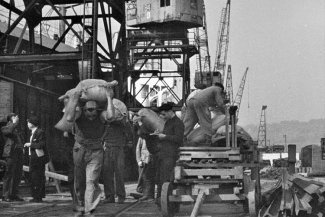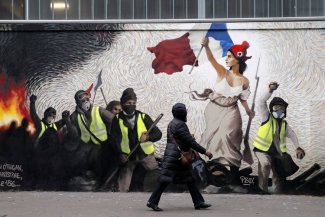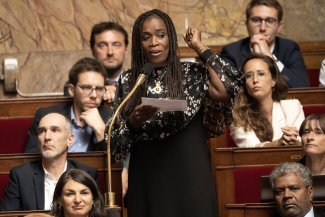“My artistic vision is guided by the desire to restore dignity to the world of farming and labour,” says French director Gillet Perret, at the preview of his new documentary about the life of a farming family in his village in the Alps. Amiens, 25 January 2024.
Gilles Perret is a French filmmaker from a small farming community in the Alps of Haute-Savoie. The son of a factory worker, he observed the people around him working both in factories and in stables from a very early age. Training his camera lens on them as a later filmmaker came naturally. Workers, their work and their rights became the central theme of Perret’s work, both documentary and fiction.
In his film La Sociale, released in 2016, Perret chronicles the struggle to create social security in France, and the men and women who fought for its creation. This system, a utopian dream of sorts, remains in place today, providing more than 67 million people access to healthcare, regardless of their income. J’veux du Soleil, released in 2019, is a road-trip film which follows French MP François Ruffin from the north to the south of France as he meets with the protestors from the Gilets Jaunes (Yellow Vest) movement along the country’s roadsides in December 2018. Another collaboration with Ruffin, Debout les Femmes! (2021), focuses on the invisible and poorly paid jobs held by women as they fight for dignity and recognition. Finally, in Reprise en Main (2022), his first work of fiction, Perret tells the story of a factory worker in Haute-Savoie who tries to buy back his factory with his childhood friends. These are just a few examples of his social engagement.
Equal Times met Perret at the Saint-Leu cinema in Amiens on Thursday 25 January 2024, at the preview of his latest documentary La Ferme des Bertrand. The film chronicles 50 years in the life of an Alpine farm, accurately depicting the hard times, the love of animals, the handing down of a tool and the pride passed on from one generation to the next. It provides an opportunity to talk about work and dignity at a time when farmers all over Europe are taking to the streets to demand a decent living from their work.
Your father was a worker and union activist with the CGT (General Confederation of Labour). How has this shaped your personal history, what role does it play in your political work and activism, and to what degree has it influenced your creative process?
My father was a factory worker. He began work at 14 like everyone else where he came from, and like everyone else he got his CGT card. He wasn’t a leader but very early on he became interested in politics, the world of work and trade unionism, even though he came from a rural background. When he came home from the factory, he looked after the cows. Our village is in a milk-producing area, so when I was a kid, everyone had cows at home. So I was immersed in this world of work from a very early age. It was my father who got me started in politics. We always talked a lot amongst ourselves but also with the Bertrands, our farmer neighbours [editor’s note: who are the characters in his documentary].
My activism has been shaped by discussions about village life and the concerns of the farmers, as well as the people I’ve met over the years. My artistic approach is above all guided by the desire to restore legitimacy and dignity to the world of agriculture and the world of labour, which have been scorned, mistreated and rendered invisible. When I studied in the 1990s, work was understood through a lens of success. Doing business, making money, that was all that mattered. I studied electronics engineering and at the time we were told that we would be the saviours of the nation, the managers of the Europe of tomorrow. But I never believed in any of that.
To have legitimacy in the world of work, in my opinion, you have to know what you’re talking about. Even though I was one of the few sons of blue-collar workers to become an engineer, I never believed that story. Just because you’ve got qualifications, it doesn’t mean you know any better than the old hands who’ve worked all their lives. I’ve always had a lot of mistrust for that kind of talk and, quite naturally, when I started to make films, I turned toward that subject: making the invisible visible and being as fair as possible about the world of work, the physical activities, the wear and tear, but also the satisfaction. I don’t want to necessarily make work out to be an enemy.
Even though many people suffer from their work and don’t like their working conditions, every time I make a film, the people I meet tell me how much they love their work and how proud they are of it. The problem is when the conditions in which they do their work don’t suit them, and that’s what I try to show in my films.
Work is a very present theme throughout your filmography. Would you define yourself as a ‘labour filmmaker’? What does that mean? Why is filming work so important to you?
The notions surrounding work, the meaning of work, a job well done, these are subjects that I’ve always encountered and which have always fascinated me. I love this world, I feel at home in it. In industry as in agriculture, there’s no room for bullshit. Filming work to show a form of authenticity that takes place over time is what documentary is all about. Taking the time to show people, to show that success is a long-term process, based on the work of previous generations.
If you’re going to film workers and the work they do, you have to have a love and understanding for both. You film something that you know or that has already made an impression on you in a different way. I like to be close to people in human terms but also with the camera. That’s why I often film without a sound technician because then you can get really close. That’s a choice I’ve made.
I want the audience to feel like they’re in my shoes, asking the questions themselves. The form I use and the way I shoot help to achieve this. When you want to film work, you have to be close to people and know what they do. That’s what drives me: people. I’m not just going to make any film about the world of work, there have to be people who interest me, who have things to say and I have to be close to them. When you’re close to them, you see their hands, their bodies, their reactions. That, in my opinion, makes you a labour filmmaker.
What do you want your documentaries to show about society? Is witnessing and acting through images a form of activism for you? Can you tell us more about this political and philosophical commitment?
I always try to ensure that my films serve a purpose, provoke debate or at least influence the way we look at something or someone. My mission of sorts is guided by the ideals that I always keep in mind about the meaning of work. Who benefits from work, who extracts the wealth, who profits from it? I’m always wondering about these economic and political aspects.
I’ve been lucky enough to meet and film some wonderful people who have fought all their lives for ideals and fought to pass on a better life to future generations. It’s my duty to continue that fight. I don’t know if this film will serve a movement, as was the case with the Gilets Jaunes, when we toured the roundabouts with François Ruffin to show the film J’veux du Soleil and fuel debate.
I wouldn’t want it to be appropriated, but if it can help the farming world, I’d certainly like that. I’m aware that La Ferme des Bertrand is a counter-model, a kind of haven of peace in the midst of a sea of misery and anger. But it’s not an anecdotal model, it’s an example of productive agriculture that feeds people, on a large farm that employs technologies that are not harmful to the environment or to the bodies of those who work there. So it is possible. It all hinges on the Protected Designation of Origin (PDO), which protects farmers from the laws of the European and global markets by protecting territories and professions. It’s a European acronym that protects the name of a product throughout the European Union. By protecting a geographical area, you protect the workers who work there, and at the same time you protect the fruits of their labour. Milk producers in Haute-Savoie are thus able to make a decent living.
Your films deal with issues such as women’s rights, labour rights and defending social protection. How do you see these concerns as universal?
The farmers’ movement, like the Gilets Jaunes movement, is based on the need for recognition and dignity. Feeding people should be a central concern, and it will increasingly become one in the coming years. When will the political powers understand this and prioritise it? We can’t go on like this. Suffering in silence, being caricatured, working all your life and not making a living from your work, receiving no recognition at all, this inevitably breeds anger and leads to conflict.
Making films like La Sociale, De Mémoire d’Ouvriers, Les Jours Heureux and Debout les Femmes! shows that every time people come together and act collectively, it is both effective and enjoyable. Social security and the National Council of the Resistance are excellent examples of social and political success. And that’s what’s universal, because it advances humanity. Not only do you do great things, but you also have a fully satisfying life thanks to the power and success of the collective.
Pitting individuals against each other always ends badly. It leads to a rise in hatred, xenophobia and a decline in human rights. The universal message lies in unity. When we’re together, things work better, we produce beautiful things and we protect ourselves collectively. This is the lesson, in my view, of French social history, but also of world social history. And the liberal forces have no interest in individuals thinking and acting collectively . That’s another reason why I make films over a long period of time, because it’s the role of the documentary filmmaker to show where we stand and to remind us where we come from in terms of political and social struggles, why it was possible and why it works.













